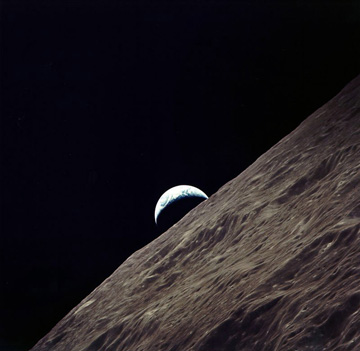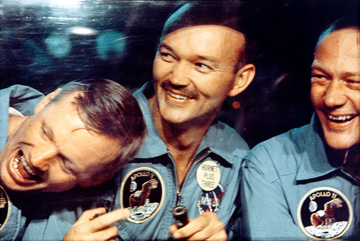In the Shadow of the Moon


The moon landing is nothing new, but In the Shadow of the Moon approaches things slightly differently - it uses nothing but words of the men who landed on the moon, and focuses almost completely on them. It doesn't feel like a movie. Director David Sington makes it feel like a conversation, which is what makes the movie so engaging. Sington mixes in interviews with the Apollo astronauts with some rare and fascinating footage of the flights and the landings themselves. The first impression is how entertaining these guys are. It feels like people are listening to the grandfathers tell a really good story.
Sington interviews nine of the surviving men - Buzz Aldrin, Alan Bean, Eugene Cernan, Mike Collins, Jim Lovell, Edgar Mitchell, Harrison Schmitt, Dave Scott, and John Young (Neil Armstrong wasn't interviewed). He follows things chronologically, starting with a brief overview of the space program, them jumps into a more detailed look at the astronaut's training and actual missions. In the Shadow of the Moon cuts between the standard talking head interviews with some amazing footage. The footage was unearthed from various archives and includes a wealth of footage shot by the men themselves. These aren't the same shots that have shown up through the years in various specials or retrospectives, but grainy shots from primitive handheld cameras from the various Apollo astronauts. As bad as some of these shots are, one has to remember that they are from the Sixties and were TAKEN ON THE MOON.
The best part about In the Shadow of the Moon is that Sington allows the astronauts to tell the story in their own words. There is little to no narration; everything is taken from Sington's extended interviews with the astronauts. This isn't a documentary on PBS (although there isn't anything wrong with that), this is a group of people, and if feels like they are addressing the viewer. Listening to them speak about their experiences on the moon while watching home video footage they shot inspires a sense of wonder and awe at the whole thing. Even some of the astronauts themselves seem to have a hard time believing where they are.
Listening to them also gives one a sense of how different things were. Sington and his interviewees place all things in historical context. The Vietnam War was raging, and if these Air Force and Navy men were not in the Apollo program, they would probably be fighting in the war. The US was also in the midst of the Cold War, and the launch of Sputnik was something of an ego-deflator for the United States, and Kennedy vowed that the US would go to the moon in a decade. But once Aldrin and Armstrong did step foot on the moon, the world rejoiced together at the collective accomplishment of man, not the United States.